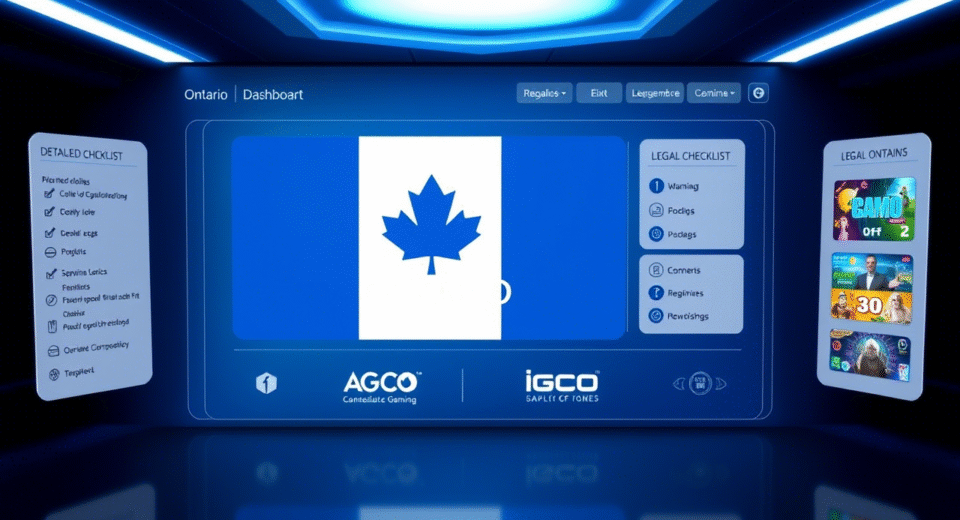Ontario Licensing 101: A Checklist for New Operators
Introduction: Why Ontario Is the Most Watched Market in North America In just a few years, Ontario has gone from a regulatory experiment to one of the most desirable gambling markets in the Western Hemisphere. Since opening its regulated iGaming market in April 2022, Ontario has attracted global operators, tech suppliers, and local startups alike. Unlike federal systems like the U.S., Canada allows provinces to regulate independently—and Ontario is leading the charge with a transparent, competitive, and strictly monitored model. But for new operators, entering Ontario means meeting a dual-regulator regime, involving both the Alcohol and Gaming Commission of Ontario (AGCO) and iGaming Ontario (iGO). It’s not just about paperwork—it’s about understanding compliance culture. Let’s break down everything you need to know to get licensed in Ontario in 2025. Quick Overview: Two Regulators, One License Path Ontario’s iGaming framework includes two distinct regulatory bodies: 1. AGCO (Alcohol and Gaming Commission of Ontario) Regulates and issues registration to operators and suppliers. Responsible for technical and compliance standards. 2. iGO (iGaming Ontario) The government-run entity that signs commercial contracts with each licensed operator. All player transactions flow through iGO systems. ✅ You must be approved by AGCO and sign an agreement with iGO to operate legally in Ontario. Why Ontario? The Business Case Step-by-Step Checklist for Getting an Ontario License Here’s your 2025 checklist to become a compliant iGaming operator in Ontario: ✅ Step 1: Incorporate and Structure Your Entity 🧠 Tip: Local incorporation is not mandatory, but having a Canadian business address and compliance rep helps with iGO engagement. ✅ Step 2: Apply for AGCO Registration Operators must register under the Gaming Control Act, 1992 via AGCO’s iAGCO portal. You’ll Need: 📌 Application fee: $100,000 CAD (as of 2025, subject to change)📆 Time to approval: 8–14 weeks if complete and clean ✅ Step 3: Sign the Operating Agreement with iGO Once AGCO registration is secured, you’ll be invited to sign a commercial contract with iGaming Ontario. This agreement defines: 💡 iGO acts as the “conducting entity”—legally, the players are customers of iGO, not your private company. ✅ Step 4: Integrate with iGO’s Centralized Systems Before launch, operators must connect to: 🧠 All Ontario-licensed operators must offer deposit limits, time outs, self-exclusion (via the centralized MyPlayBreak program), and RG messaging. ✅ Step 5: Perform Final System Integrity and Compliance Testing Your platform and games must pass technical certification by an AGCO-recognized lab. These include: 🧪 Only approved suppliers and games can be used. You may license third-party games via registered suppliers. ✅ Step 6: Launch and Begin Reporting After all integrations and final approvals, you’re cleared to launch. Your post-launch obligations include: Requirement Frequency Financial and game-level reports Weekly Player protection metrics (RG, self-exclusion) Monthly AML and suspicious transactions Immediate Revenue share payments to iGO Monthly You’ll be assigned an iGO Account Manager who monitors operations and assists with compliance. Special Considerations for 2025 🪙 Crypto? ❌ Ontario prohibits cryptocurrency for player transactions. Only fiat currency via regulated payment providers is allowed. 🎮 Esports & Skill Games? ✅ If designed appropriately, esports betting and P2P skill-based gaming are permitted—but require specialized disclosure and approval. 💼 Affiliate Marketing? ✅ With Rules You may work with affiliates, but: Ontario Licensing Timeline: What to Expect Milestone Estimated Duration Incorporation & Document Prep 2–3 weeks AGCO Registration Review 2–3 months iGO Agreement & Integration 1–2 months Technical Testing & Final OK 1 month ⏱️ Total Time: 3.5 to 6 months Delays often happen due to incomplete applications or vague AML/KYC policies—so have a dedicated team or consultant. Ontario vs Other Regulated Markets Feature Ontario Malta (MGA) UKGC Player Base 🇨🇦 Canada only 🇪🇺 EU-friendly 🇬🇧 UK only Revenue Share w/ Govt ✅ Yes (iGO) ❌ No ❌ No Crypto Allowed ❌ No ⚠️ Limited ❌ No Time to Market ⏱️ 4–6 months 5–7 months 4–8 months Transparency & Oversight ✅ High ✅ High ✅ Very High Ontario offers unique access to the North American market without the complexity of U.S. state-by-state licensing. Common Mistakes to Avoid ❌ Underestimating iGO’s technical integration requirements❌ Using unregistered game suppliers❌ Offering unauthorized bonus types (e.g., non-transparent wagering)❌ Missing compliance deadlines (iGO is not forgiving)❌ Affiliate campaigns targeting out-of-province traffic Final Thoughts: Ontario Is Tough, But Worth It Ontario may not be as “fast and easy” as Curaçao or as crypto-liberal as Costa Rica—but it offers something invaluable: 🔒 Legitimacy, regulatory alignment, and public trust. Whether you’re a sportsbook giant or a niche casino startup, having an Ontario license opens doors in North America—and signals to regulators, banks, and investors that you’re playing by the rules. So prepare your documents, map your integrations, and build a responsible gambling-first culture. Ontario is open for business—but only to those who play clean.







